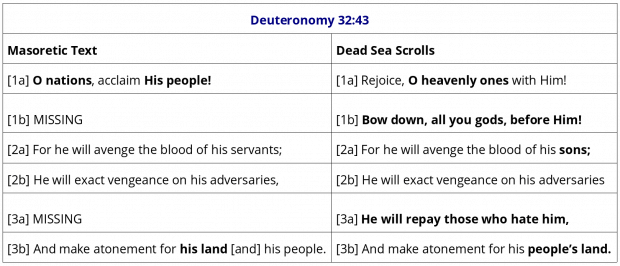After the great flood, everyone had one language. Humanity congregated in the region of Babylonia (“the land of Shinar”) and started building a tower that would reach into the heavens (Gen 11:1–9). God stopped the project by transforming the single language into many—dispersing humanity over the earth and creating the nations and regions listed in Genesis 10. Most people think it ends there, but there’s more. The story picks up again in Deuteronomy 32:8–9. And the story changes, depending on what Bible version you use.
When the Most High apportioned the nations as an inheritance, when he divided up humankind, he established the borders of the peoples according to the number of the sons of God. But the Lord’s portion is his people, Jacob his allotted heritage.
Some Bibles may read “sons of Israel” instead of “sons of God.” The difference is due to an ancient manuscript disagreement with major theological ramifications.
Is ‘sons of Isarel’ accurate?
Most English Bibles have “sons of Israel” or something similar because the translation is based on the traditional Hebrew text of the Old Testament, known to us as the Masoretic Text. But how does God dividing humankind and fixing the boundaries of the peoples “according to the number of the sons of Israel” make any sense? Deuteronomy 32:8 hearkens back to what happened at Babel—and Israel did not exist at that time! If you read through the “Table of Nations” in Genesis 10, Israel does not even appear.
“Sons of God” is the reading in two other older manuscripts: the Septuagint, an ancient Greek translation of the Old Testament, and the Dead Sea Scrolls, a set of manuscripts discovered in the desert not too far from Jerusalem. Bible translators agree that “sons of God” is the more original reading, but they usually place it in a footnote at Deuteronomy 32:8, not in the actual text. The English Standard Version, though, and others, place “sons of God” into their translation.
Why is there a difference?
Deuteronomy 32:8 is a textbook example of how later scribes sometimes changed the biblical text in a misguided attempt to “protect” God’s reputation. Other parts of Deuteronomy were also changed by scribes (e.g., 32:43). When you line up the Dead Sea Scroll reading with the Masoretic Text—the traditional Hebrew text most English translations are based upon—you can see that the original was altered.
Notice that Deuteronomy 32:43 in the Dead Sea Scrolls has three poetic pairings. Since it’s a poetic section, symmetry is not only important, it’s expected. The Masoretic Text reading has removed or altered parts of two of the pairings. The first, as in Deuteronomy 32:8, eliminates references to other divine beings (“sons of God” in 32:8; “heavenly ones” and “gods” in 32:43). At some point, a scribe thought this reference to other gods was theologically offensive. The first line of the final pairing was removed because someone hating God was also offensive.
God, of course, doesn’t need to be protected by a zealous scribe or anyone else. Israel’s doctrine was that Yahweh was unique and above all other divine beings (Pss 29:1; 89:5–7). In a severe judgment, the nations at Babel were disinherited by Yahweh and given over to the administration of other gods (Deut 4:19–20; 32:8), whose actions would be judged by the God of Israel (Psa 82:1, 6). This paved the way for God to create a new people, Israel, in the very next chapter of Genesis. And ironically, it was through Abraham’s seed that the disinherited nations would be reclaimed (Gen 12:1–3).
This article is excerpted from Dr. Heiser’s book I Dare You Not to Bore Me with the Bible.








